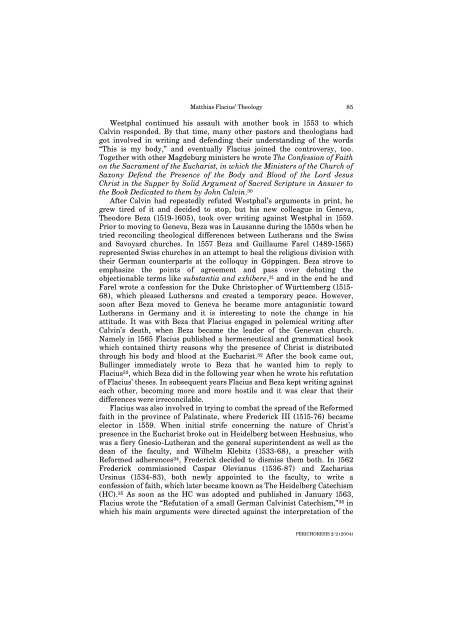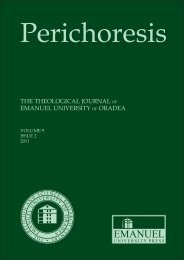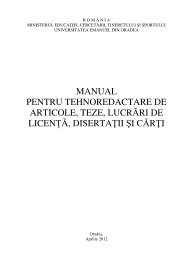Paradise Lost - Universitatea "Emanuel"
Paradise Lost - Universitatea "Emanuel"
Paradise Lost - Universitatea "Emanuel"
Create successful ePaper yourself
Turn your PDF publications into a flip-book with our unique Google optimized e-Paper software.
Matthias Flacius’ Theology<br />
Westphal continued his assault with another book in 1553 to which<br />
Calvin responded. By that time, many other pastors and theologians had<br />
got involved in writing and defending their understanding of the words<br />
“This is my body,” and eventually Flacius joined the controversy, too.<br />
Together with other Magdeburg ministers he wrote The Confession of Faith<br />
on the Sacrament of the Eucharist, in which the Ministers of the Church of<br />
Saxony Defend the Presence of the Body and Blood of the Lord Jesus<br />
Christ in the Supper by Solid Argument of Sacred Scripture in Answer to<br />
the Book Dedicated to them by John Calvin. 30<br />
After Calvin had repeatedly refuted Westphal’s arguments in print, he<br />
grew tired of it and decided to stop, but his new colleague in Geneva,<br />
Theodore Beza (1519-1605), took over writing against Westphal in 1559.<br />
Prior to moving to Geneva, Beza was in Lausanne during the 1550s when he<br />
tried reconciling theological differences between Lutherans and the Swiss<br />
and Savoyard churches. In 1557 Beza and Guillaume Farel (1489-1565)<br />
represented Swiss churches in an attempt to heal the religious division with<br />
their German counterparts at the colloquy in Göppingen. Beza strove to<br />
emphasize the points of agreement and pass over debating the<br />
objectionable terms like substantia and exhibere, 31 and in the end he and<br />
Farel wrote a confession for the Duke Christopher of Württemberg (1515-<br />
68), which pleased Lutherans and created a temporary peace. However,<br />
soon after Beza moved to Geneva he became more antagonistic toward<br />
Lutherans in Germany and it is interesting to note the change in his<br />
attitude. It was with Beza that Flacius engaged in polemical writing after<br />
Calvin’s death, when Beza became the leader of the Genevan church.<br />
Namely in 1565 Flacius published a hermeneutical and grammatical book<br />
which contained thirty reasons why the presence of Christ is distributed<br />
through his body and blood at the Eucharist. 32 After the book came out,<br />
Bullinger immediately wrote to Beza that he wanted him to reply to<br />
Flacius 33 , which Beza did in the following year when he wrote his refutation<br />
of Flacius’ theses. In subsequent years Flacius and Beza kept writing against<br />
each other, becoming more and more hostile and it was clear that their<br />
differences were irreconcilable.<br />
Flacius was also involved in trying to combat the spread of the Reformed<br />
faith in the province of Palatinate, where Frederick III (1515-76) became<br />
elector in 1559. When initial strife concerning the nature of Christ’s<br />
presence in the Eucharist broke out in Heidelberg between Heshusius, who<br />
was a fiery Gnesio-Lutheran and the general superintendent as well as the<br />
dean of the faculty, and Wilhelm Klebitz (1533-68), a preacher with<br />
Reformed adherences 34 , Frederick decided to dismiss them both. In 1562<br />
Frederick commissioned Caspar Olevianus (1536-87) and Zacharias<br />
Ursinus (1534-83), both newly appointed to the faculty, to write a<br />
confession of faith, which later became known as The Heidelberg Catechism<br />
(HC). 35 As soon as the HC was adopted and published in January 1563,<br />
Flacius wrote the “Refutation of a small German Calvinist Catechism,” 36 in<br />
which his main arguments were directed against the interpretation of the<br />
85<br />
PERICHORESIS 2/2 (2004)




